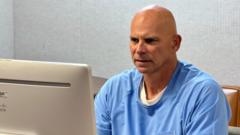Following a lengthy parole hearing, Lyle Menendez has been denied release from prison, just one day after his brother Erik faced the same fate. The brothers were convicted in the notorious 1989 murder of their parents, with discussions of their troubled past and conduct in prison impacting the decisions of the parole board. They may have future opportunities for parole and are also pursuing clemency requests.
Menendez Brothers Face Setback as Both Denied Parole After Decades in Prison

Menendez Brothers Face Setback as Both Denied Parole After Decades in Prison
Lyle Menendez, alongside his brother Erik, has been denied parole in the high-profile case of their parents' murder, hindering their hopes for freedom after over 30 years behind bars.
Lyle Menendez has been denied parole one day after his brother Erik was similarly blocked from being freed from prison, following more than three decades since their convictions. The Menendez brothers, who gained notoriety for the 1989 murders of their parents at their Beverly Hills home, faced separate, exhaustive hearings before California's parole board. This pair of denials presents a significant hurdle as they recently sought to leverage prior court wins to bolster their chances for freedom.
Lyle, now 57, will have the opportunity to apply for parole again in three years. During the trials, the Menendez brothers claimed they acted in self-defense in light of years of abuse by their father—a narrative hotly contested by prosecutors, who painted them as entitled individuals who meticulously planned the murders and subsequently misled investigators while indulging in extravagant spending.
In a virtual hearing conducted from the San Diego prison where he is incarcerated, Lyle expressed remorse, declaring, "I'm profoundly sorry for who I was … for the harm that everyone has endured." The parole board wrestled with whether he posed a potential risk to society and scrutinized aspects of his life, including his educational history at Princeton University and various legal infractions prior to the killings.
A significant point raised during the hearing was Lyle's recurrent illicit use of cell phones in prison, which was deemed problematic by the panel given the potential implications for prison safety and order. Despite his claims of benefiting fellow inmates through educational programs and mentorship, the board noted his pattern of rule violations, including a guilty plea related to cell phone usage just months prior.
Assessed as presenting a "moderate risk" of violence, the parole board's decision underscores the complexities surrounding Lyle and Erik's past conduct in conjunction with the deeply emotional nature of their crimes. The brothers remain undeterred, with each entitled to reapply for parole after a three-year waiting period. Meanwhile, clemency requests pending before California Governor Gavin Newsom could drop them into a politically sensitive situation, further complicating their quest for freedom.
Alongside the clemency push, the Menendez brothers are seeking a new trial based on allegations of chronic abuse by their father, but this initiative faces opposition from the district attorney's office. During Lyle’s hearing, prosecutor Ethan Milius emphasized a lack of accountability on Lyle's part and skepticism about genuine reform reflected in his prison behavior.
Supporters, including family members, rallied virtually during the hearing advocating for Lyle. His cousin emphasized Lyle's growth despite his life sentence, arguing he would not pose a risk if released, underscoring a belief in accountability from their family. The path ahead for the Menendez brothers remains fraught with challenges, as they navigate the legal system in pursuit of both clemency and justice.



















